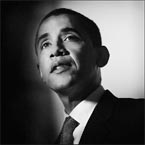Obama, Congress launch trillion-dollar economic rescue
 Washington - Just days before inauguration, president-elect Barack Obama and the new Congress have taken their first steps on the long road to restoring the struggling US economy.
Washington - Just days before inauguration, president-elect Barack Obama and the new Congress have taken their first steps on the long road to restoring the struggling US economy.
Democratic legislators, who hold majorities in both houses of Congress, offered the first detailed look Thursday into an 825- billion-dollar economic stimulus package, a key plank of Obama's plan to save or create as many as 3 million jobs.
Some 550 billion dollars over two years will be devoted to public spending on everything from transportation infrastructure to renewable energy projects, education and technology, as well emergency cash infusions for states suffering budget shortfalls.
In addition to stimulating a sagging economy, Obama said the spending would help update the nation's ailing infrastructure and other areas to "make America strong and competitive in the 21st century."
Another 225 billion dollars will deliver one of Obama's key campaign promises: providing 95 per cent of Americans with tax relief.
In addition, the Senate Thursday gave the go ahead for the release of another 350 billion dollars to help the country's ailing financial sector. The House of Representatives takes up the matter next week.
The Senate vote marked one of the first tests for Obama's presidency, though he only takes office on Tuesday. Obama had even reportedly threatened to use his first veto if the Senate blocked the release of the 350 billion dollars.
Some legislators have been skeptical that Obama's administration will do a better job stabilizing the financial system than the Bush administration, which faced strong criticism for its use of the first 350 billion dollars.
But Obama said releasing the second half of the 700-billion-dollar financial rescue package, first passed in October, would be crucial to provide him with some breathing room in his first days in office, in case the financial sector should take another turn for the worse.
Obama will enter the White House in the worst economic crisis in decades.
Together, the president-elect hopes the 1.175 trillion dollars in planned spending can pull the US economy out of an already year-long recession and restore some confidence to consumers who have sharply cut personal spending.
Some 2.6 million Americans lost their jobs in 2008 as a financial and housing market crisis spilled over into the wider economy, cutting access to credit and depressing consumer spending.
Banks, carmakers and states are all facing cash shortfalls and have been clamouring for the federal government to inject more money into the economy.
Democratic leaders have vowed to get the 825-billion-dollar stimulus passed by February 13 at the latest, but Obama does face some political opposition.
Fiscal conservatives from both parties in Congress are worried the stimulus and financial rescue will add to an already ballooning US budget deficit.
That deficit could easily top 1 trillion dollars this year. The US government racked up a record deficit of 485 billion dollars just from October to December - the first quarter of the current budget year - and larger than the 455 billion dollars of red ink from the entire previous budget.
Most economists believe the new deficit is worth taking on if it means reviving the world's largest economy, which may have shrunk more than 5 per cent in the fourth quarter of 2008.
"We need solutions on the scale of our problems. Tinkering around the edges wont do," said Larry Mishel, president of the Economic Policy Institute.
On Tuesday, Obama received the support of Federal Reserve Chairman Ben Bernanke, an appointee of President George W Bush who will remain in his job until 2010.
In a speech in London, Bernanke said that the economic stimulus should provide a much-needed boost to the US economy but warned that stabilizing the financial system remains vital to a durable recovery. (dpa)